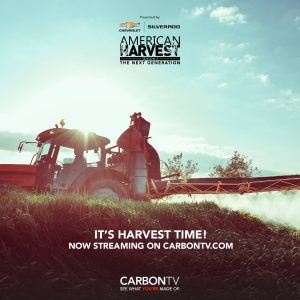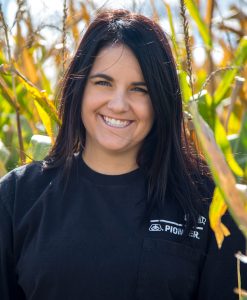Where there’s crops, there’s harvest, and no series captures the hard work and determination of farmers better than CarbonTV’s “American Harvest.”
The second season of the series — which debuted October 27, 2016, as “American Harvest: Next Generation” — explores the younger generation in ag looking to stoke or rekindle the fires of their farming passion. They strive to find a way into an agricultural world that is far different than the one in which their parents grew up. Oftentimes, it’s not just farming that they work on, it’s their families, too.
The series reconnects with Leah Joy Johnson, whose multigenerational operation was the focus of the first season. This time around, the 25-year-old Johnson joins several other young farmers who describe the rigors of harvest, the need to juggle two jobs, and the desire to live up to the family legacy. Among those featured in Season 2 are Josh Fiedler, Chad Olson, and Johnson’s twin cousins, Ty and Tanner Johnson.
Leah Johnson has changed and grown since Season 1. She sells seeds full time to farmers while also working on her family’s Evansville, Minnesota-based operation. In addition to “American Harvest,” Johnson was featured recently in CarbonTV’s original “Women Who Farm.”
She talked exclusively with AGDAILY about what it means to be a voice for today’s agricultural landscape.
AGDAILY: What has it felt like to be able to tell your story on CarbonTV’s “American Harvest” and to be able to reach people who may not know much about the farming industry?
JOHNSON: Being a Millennial, it’s really important to me to showcase what farming is now because so many people are generations removed from a farm — at best they maybe have a second or third cousin who lives on a farm site, but they’re not actively farming. I think it’s a blessing to be able to be able to tell my story and to show people a realistic view of what farming is today. Everybody has their idealistic views of agriculture: It’s the farmer holding the pitchfork. That’s just not a reality anymore. Most farmers have at least an undergraduate degree of some sort, and sometimes that’s not even enough to get you really prepared for all the different hats you’ll have to wear, whether it’s being an economist, a businessman, an employer, a manager, a marketer. Every day, a farmer is wearing a dozen different hats, while still driving a tractor and getting the manual labor done.
AGDAILY: Is there anything particularly difficult about doing the filming or being in the spotlight?
JOHNSON: I’ve always been very comfortable as far as public speaking goes. I’ve never been a shy person, and the environment that this series puts you in, it’s one or two guys with a camera, yet they don’t know much about agriculture. They may not know why I’m driving the tractor across the field and tilling the ground and what that means for next year or 10 years from now. It’s really just a conversation piece of explaining what I do. I think more farmers should take opportunities like that to show people what farming is all about, because there’s such little knowledge out there about just the simple day-to-day tasks that we do.
AGDAILY: You’re obviously very passionate about agriculture, and you are a fifth-generation farmer. Was there ever a question in your mind about whether you would go into the ag industry?
JOHNSON: When I graduated from high school, I was pursuing a degree in pharmacy because I had worked in a nursing home all through high school as a part-time job off the farm (it paid better, to be honest with you!). I fell in love with the health care industry. Especially working at a local nursing home, I knew a lot of the residents, and I knew where they farmed, and I would be able to give them updates about their farms.
When I got to college (North Dakota State University) and started my coursework, I looked around at the other kids, and I thought back to why I really loved working at that nursing home — it was because of the farmers I got to visit with, hearing their stories about dairy farms and crop farms, and how the landscape has changed in their lifetime. I realized that even though I liked the idea of a steady paycheck that a pharmacist would get, my heart was embedded in agriculture. So when I was 19, I switched my major to ag economics and switched my minor to ag communications. I haven’t looked back.

AGDAILY: You were featured in CarbonTV’s “Women Who Farm” series along with Aubrey Fletcher and Marlene Williams. Do you see yourself as a role model for other females who are interested in farming?
JOHNSON: I would love to get myself in a position to be a role model. I’m very blessed that my mom has an active role on our farm, and we’ve always surrounded ourselves with neighbors whose wives are very active, too. The female aspect of it has never been something that has really deterred me. I love when I can visit with a young girl who’s deciding where to go to college or what major to choose and I can show her what I do off the farm. I can show her that I can do that and still be on the farm as well. I’m getting to live and breathe it at my day job or when I’m on the farm.
AGDAILY: What have you noticed about being a woman in agriculture that’s different compared with your male counterparts?
JOHNSON: I think my gender makes people a little more comfortable, and that’s coupled with my personality. It seems like, if I’m going into a high-stress situation, with my demeanor I’m able to diffuse the situation. A guy is less likely to swear if I’m standing right there, and that diffuses any sort of confrontation. And going beyond my gender, being a Millennial, I have a lot to prove because of how the media portrays us. A lot of young farmers all over have a lot to prove because we haven’t seen the financial crippling that most farmers saw in the ‘80s. We have a lot to prove to the other generations, and we have a lot to prove to ourselves.
The only way I’m able to do that every day is waking up with a really positive attitude. Even if I went to bed really frustrated, or if I’m stressed out, tomorrow is another day. If you don’t have a positive attitude and optimism in agriculture, you’re never going to get anywhere. There are so many things that are out of our control: Mother Nature, market pricing, the elections. … I don’t let myself go down that rabbit hole.
AGDAILY: How do you use social media to be an agvocate?
JOHNSON: I’m in an interesting position being a 25-year-old single woman. I was in a sorority in college, and my community of friends in college were not primarily involved in agriculture. … Social media has been a great way, on a very local level, to inform them of ag issues and the importance of supporting American farmers. I love using Snapchat for that reason, so I can show them for 10 seconds what I’m doing. I use my personal social media a lot in a more political way over ag issues, such as legislation that’s going to take place. My mom and I also run a Facebook page for our farm called Johnson Farmgirls, and it has about 1,200 likes, and we post the daily happenings on our farm.
AGDAILY: What’s your advice for any young person who wants to get into farming?
JOHNSON: The best advice I can give someone is to spend time working part-time for a farmer. If you do decide to go to college, get multiple types of internships. If you want to be involved in agriculture but aren’t sure where you fit, try a summer working at a bank that works with farmers as a lender. Guess what? The farm will be still there, and you can go home and farm, but 20 years from now, you don’t want to be asking yourself, “What if I tried something else?” Now is the time to try as many different things as possible to find your fit. I had six different internships, and seed sales was not at the top of my list at all. But I took the internship and fell in love with it, and here I am today.
I think it’s important to try different things on as well as off the farm, and if you’re interested in getting into farming, you have to be patient and willing to give up a lot. You might end up like me farming while working a full-time job. That doesn’t seem fun when you’re 25 and there’s a lot of sacrifices. But if it’s what’s truly in your heart and it’s your passion, you have to do it.
Did you like what you read? Sign up here in a heartbeat to get the best from AGDAILY.com!




